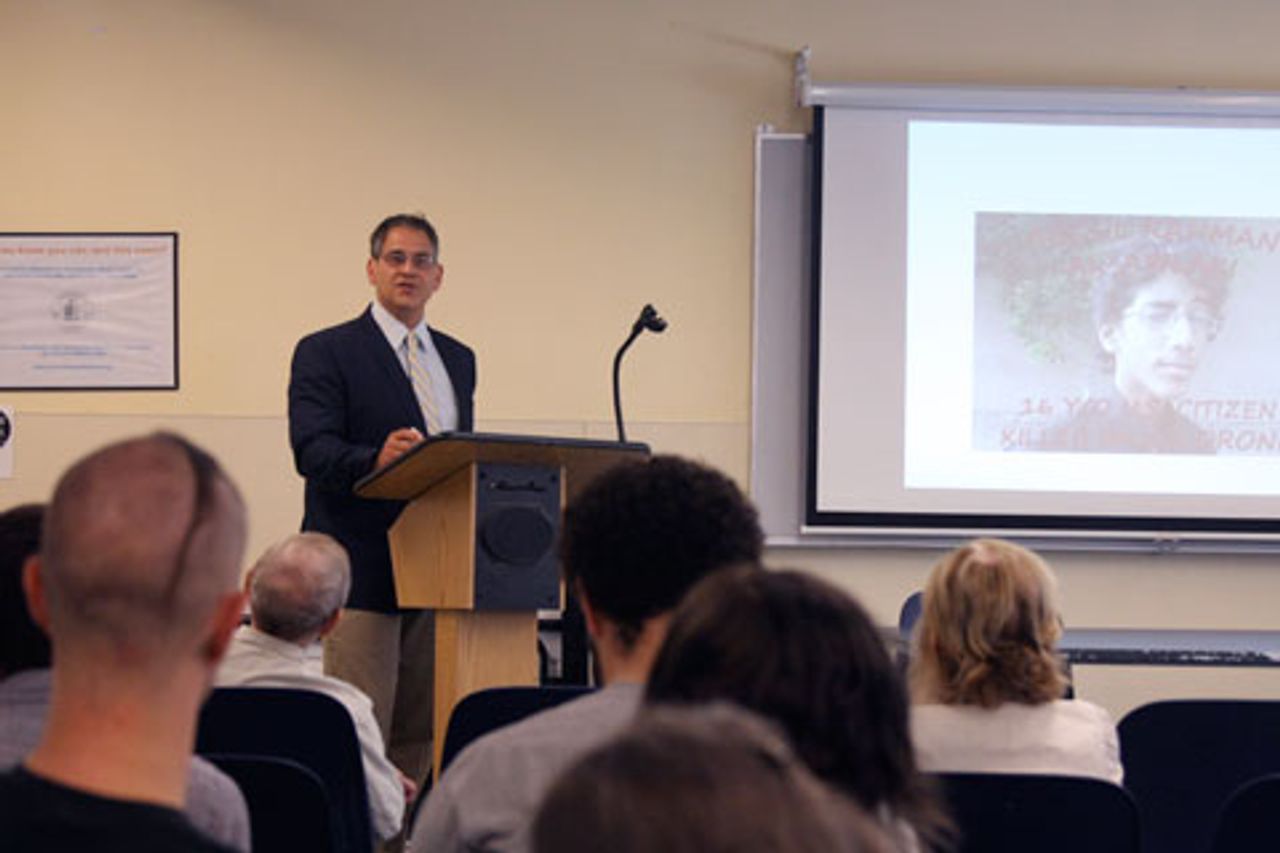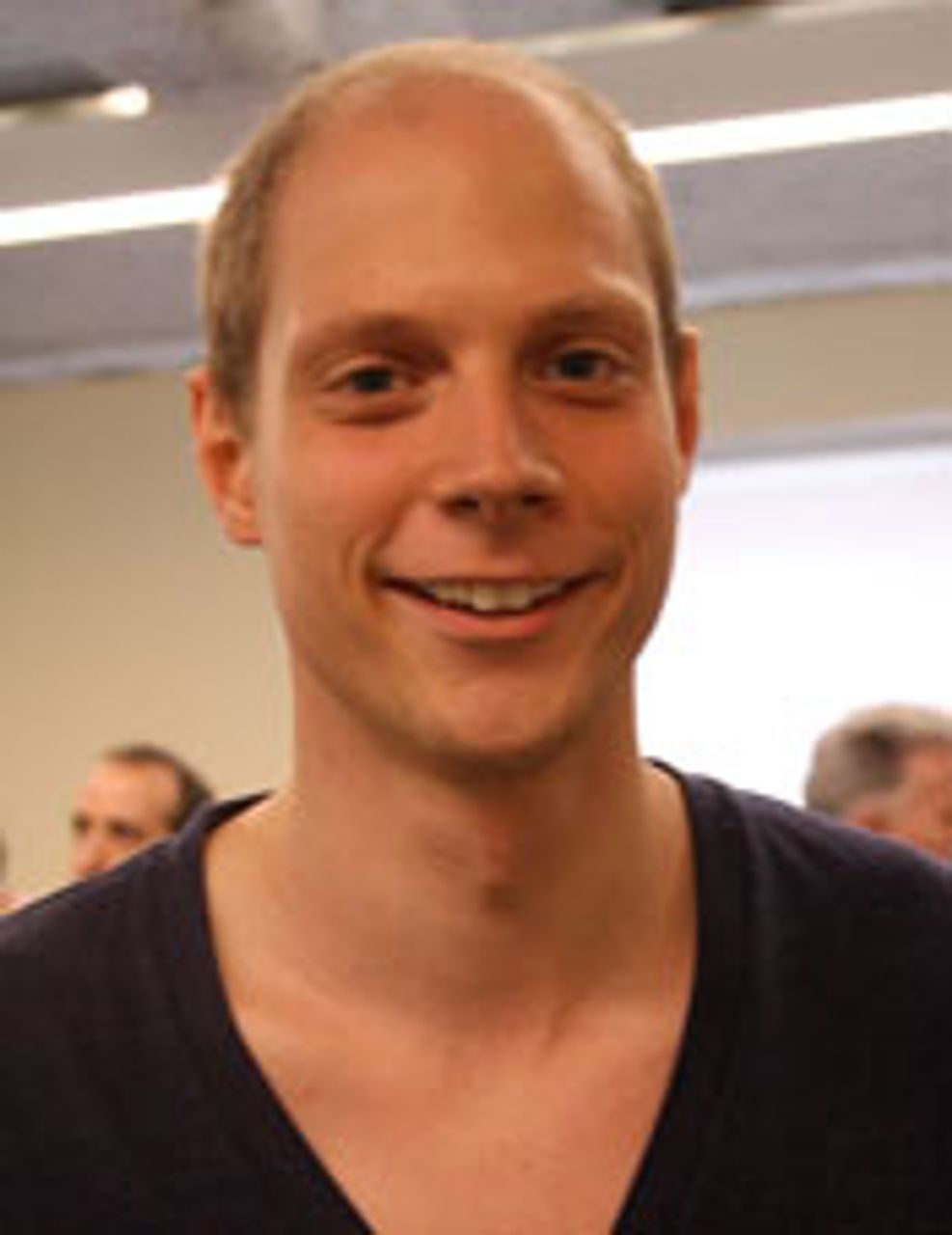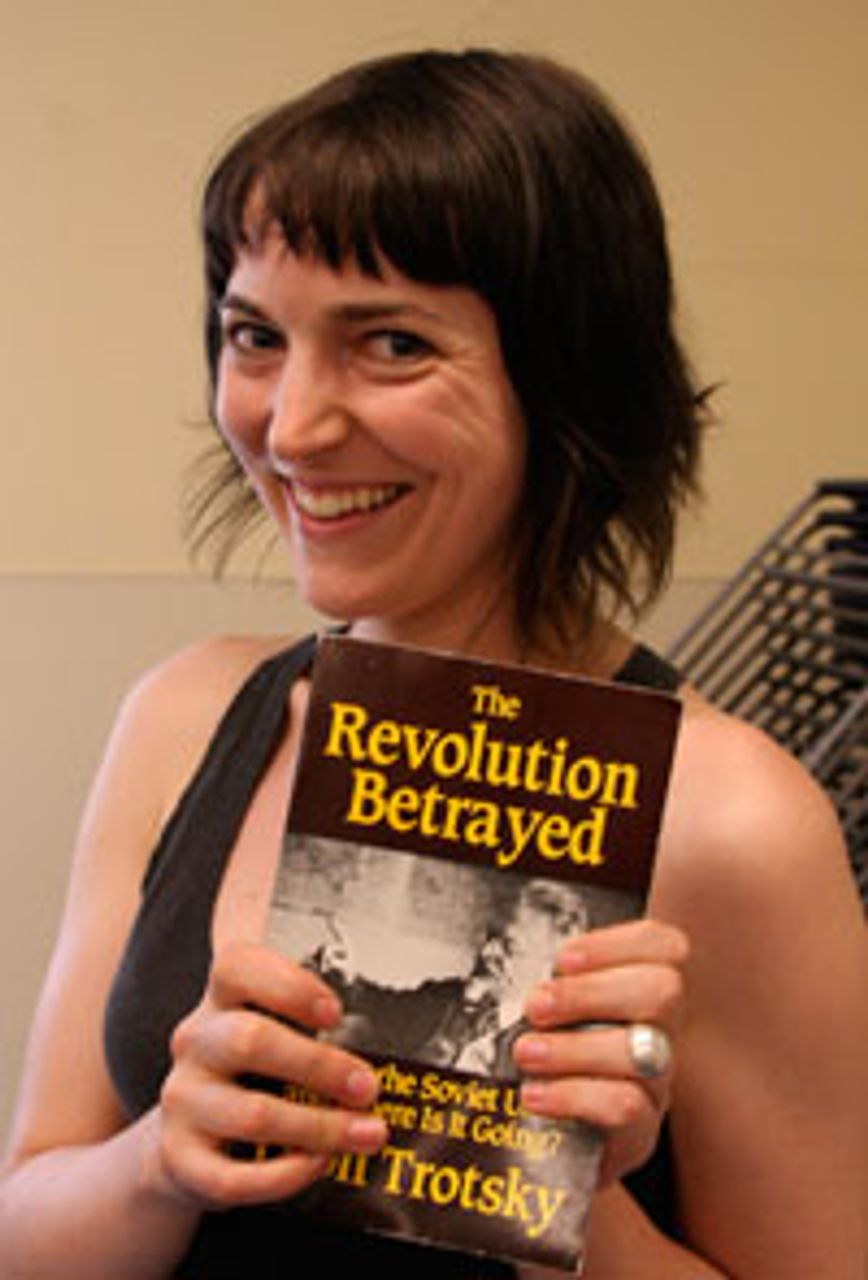 White addressing the meeting
White addressing the meetingSocialist Equality presidential candidate Jerry White addressed a meeting Sunday in New York City titled “Obama, drones and the crisis of American democracy.” About two dozen students and workers from New York City and New Jersey attended.
White began by stressing the SEP’s international working class perspective. He noted that he had come to New York after giving a meeting in Montreal, Quebec, the center of an ongoing student strike against tuition increases. Unlike Obama, White said, he was not in Manhattan to hold a $40,000 a plate fundraiser at the home of a hedge fund executive, like the president did earlier in the month, but to discuss the political perspective and program needed by workers and young people to oppose the attack on their living standards and basic rights.
The SEP candidate devoted the remainder of his remarks to examining the origins and far-reaching implications of the explosion of militarism and the decay of democracy in the United States. He focused on the Obama administration’s assertion of the right to assassinate US citizens in drone attacks, without any judicial review.
None of these issues are being discussed in the upcoming elections, White explained. He noted that both candidates—Obama and Republican challenger Mitt Romney—speak for a small layer of the financial aristocracy.
Obama, White noted, had launched almost six times more drone strikes than his predecessor, George W. Bush. Drones have been used in Afghanistan, Pakistan, Yemen and Somalia as part of a boarder plan by the US to control the Middle East and the globe. The US was preparing for future possible interventions in Syria, Iran, and eventually confrontations with Russia and China.
“According to a recent article in the New York Times,” White said, “Obama personally approves all the drone strikes in Somalia and Yemen, and the more complex ones in Pakistan. He looks over a list of mug shots and reviews biographies of individuals with his advisers in weekly meetings that are nicknamed ‘terror Tuesdays.’
“Among the countless targets was a US citizen, New Mexico born Anwar al-Awlaki.” For Obama, the basic constitutional rights that forbid presidential assassination of US citizens are irrelevant. “Obama is even quoted about the killing of Awlaki, saying, ‘This one was easy,’ while aides told the Times that the president evinced no qualms about killing the cleric.”
The Obama administration’s theory of “due process” invests in the president the ability to carry out any act, including assassination, without any oversight. This has the most far-reaching implications. “If the US president can order the assassination of a US citizen, without trial, without the presentation of evidence or even charges, without the opportunity to challenge witnesses and statements, then democratic rights are rendered meaningless.”
White then connected the growth of militarism to the attack on democratic rights more broadly within the United States. In particular, he cited the use of provocateurs in infiltrating activist groups, leading to the arrest and prosecution of five individuals on “terrorism” charges during last month’s protests against the NATO summit in Chicago.
The Obama administration is also overseeing the growing use of drones within the United States, with plans to deploy 30,000 within the decade. Some of these drones are the size of insects, capable of entering people’s homes. “These drones make spying of the past century look like child’s play,” White said.
White stressed that the decay of democracy was bound up with the immense growth of social inequality and the deep crisis of American capitalism. Under conditions of a deepening economic depression, the American ruling class is implementing a historic attack on working class living standards, while engaging in endless war abroad. This program cannot be carried out through democratic means.
The program of the ruling class, White concluded, had to be met with the independent political mobilization of the working class on the basis of a socialist and internationalist perspective.
The opening report was followed by many questions and further discussion. One audience member asked White to define the working class.
The SEP candidate explained that the working class constituted the vast majority of the population in the US and internationally. It was made up of all those who worked for a paycheck and whose physical or mental labor was exploited to produce the profits of the major corporations and banks.
“The technological and economic advances over the last three decades,” White said, “have not led to the disappearance of the working class, as various demoralized ‘left’ academics had claimed, but added billions in China, India and other countries. At the same time, large sections of the population that were formerly considered ‘middle class’ have been proletarianized and are living ever more insecure lives.”
New York City, White said, provided a picture of the sharp class divisions that characterized American society. Millions of workers produced the wealth for a handful of multimillionaires and Wall Street investors who benefited. At the same time, he stressed, there were upper middle class sections of the population—highly paid administrators, trade union functionaries, well off lawyers, doctors and academics—who were also upset about the division of wealth in society. “These elements are not looking to put an end to capitalism but to effect a redistribution of wealth in the top 10 percent of the population. This is the constituency for what we call ‘pseudo-left’ politics,” White said.
Another questioner asked why the SEP fought so forthrightly for socialism. He said it would be better to water down the party’s program in order to get more votes, claiming that most workers were against socialism and politically backward.
White responded by saying that the goal of the SEP was not simply to win votes, let alone tailor its program to an impressionistic assessment of what workers were willing to accept. “Our task is to tell the working class the truth and build a political leadership that will fight for the only program to put an end to war and defend their social and democratic rights, that is the socialist overthrow of capitalism.”
White said there were real problems in the development of the consciousness of the working class, given the long-time domination of the anti-communist trade union bureaucracy, the impact of Stalinism and the post-war boom. But, he insisted, profound changes in the objective situation, above all the failure of American and world capitalism, were sharply shifting political consciousness and undermining faith in the capitalist system.
White spoke about the experiences of the SEP campaign, including discussions with Cooper Tire workers in Ohio and Caterpillar workers in Illinois, which pointed to the class character of society and raised the issue of revolution.
“All those ex-radicals who denounce the working class as hopelessly backward do so in order to justify their support for the Democratic Party, even as it wages war, destroys democratic rights and attacks the jobs and living standards of workers. Our job,” White said, “is to resolve the crisis of leadership and prepare for the massive upheavals coming in the US and internationally.”
On the question of how the socialist movement had evolved from the time of Marx and Engels, White placed emphasis on the lasting relevance of the ideas of these great thinkers. The founders of scientific socialism, White said, revealed the laws of the capitalist system and uncovered tendencies, especially of the global character of economics, politics and the class struggle, that were still in early stages of development.
 Ryan
RyanPointing to the predictive capacity of Marxism, White noted that Leon Trotsky had written in 1936 that the Stalinist bureaucracy would “devour the workers’ state” and restore capitalism to the Soviet Union if the working class did not overthrow of the bureaucracy and return the USSR to the program of world socialist revolution. “While the US State Department and the myriad of ex-radicals that believed in the permanence of the Stalinist bureaucracy were caught unawares by the fall of the Soviet Union in 1991, the Trotskyist movement was not.”
After the question and answer section people broke up into groups to discuss the meeting. A WSWS reporting team spoke to some of them.
Ryan, a graduate student at CUNY, was pleased with how the meeting went. “For anyone that’s followed what’s been going on in the world, Jerry White’s report was a good overview. I’ve been following the World Socialist Web Site for a while now, and I don’t know anything in particular I disagree with.
 Zoe Logan
Zoe Logan“What struck me the most about the meeting was the focus on the working class. I came to this meeting because I’m not going to vote for Obama or Romney, and I think that White’s focus on the interests of the working class is the right idea. Look at what’s been going on in Greece, Spain or Quebec. All of that energy needs to be focused, and I think focusing on the working class is the way to do it."
Zoe Logan, who works as fabricator for an architect, said, “A lot of this makes sense for me. I know a lot about history and that helps me understand what is going on.
“With the drone strikes it is a question of why this is going on and that it is kept under a fog of secrecy. It is a symptom of a larger gap between what the government does and what it says it does. This is part of a war to control oil and natural resources in those countries.”
